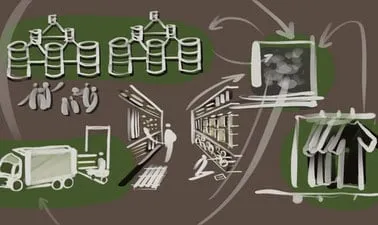
Supply Chain Technology and Systems 
This course explores the fundamental principles and concepts of supply chain management, and how they can be implemented through the use of technology and systems. Students will gain an understanding of how to apply these models to real-world supply chains. ▼
ADVERTISEMENT
Course Feature
![]() Cost:
Cost:
Free
![]() Provider:
Provider:
Edx
![]() Certificate:
Certificate:
Paid Certification
![]() Language:
Language:
English
![]() Start Date:
Start Date:
3rd Jan, 2024
Course Overview
❗The content presented here is sourced directly from Edx platform. For comprehensive course details, including enrollment information, simply click on the 'Go to class' link on our website.
Updated in [March 06th, 2023]
This course provides an overview of supply chain technology and systems. Students will learn fundamental concepts, core systems, and data analysis. Topics covered include IT fundamentals, software processes, data modeling, UML, relational databases, SQL, XML, web services, service-oriented architectures, ERP, WMS, and TMS systems, software selection process, software upgrade and implementation projects, and visualization and big data analysis techniques. No prior programming experience is required.
[Applications]
Upon completion of this course, participants will have a better understanding of the fundamental concepts, core systems, and data analysis techniques used in supply chain technology and systems. They will be able to apply this knowledge to their own supply chain operations, such as selecting the right software, managing software upgrades, and analyzing data. They will also be able to use the data analysis techniques to gain insights into their supply chain operations.
[Career Paths]
Job Position Paths:
1. Supply Chain Technology Analyst: Supply chain technology analysts are responsible for analyzing and optimizing the technology used in a supply chain. They must be knowledgeable in the fundamentals of supply chain technology, such as project management, software processes, data modeling, UML, relational databases, and SQL. They must also be familiar with Internet technologies, such as XML, web services, and service-oriented architectures.
2. Supply Chain Systems Engineer: Supply chain systems engineers are responsible for designing, developing, and maintaining the systems used in a supply chain. They must be knowledgeable in the fundamentals of supply chain technology, such as project management, software processes, data modeling, UML, relational databases, and SQL. They must also be familiar with Internet technologies, such as XML, web services, and service-oriented architectures.
3. Supply Chain Data Analyst: Supply chain data analysts are responsible for analyzing and interpreting the data generated by the systems used in a supply chain. They must be knowledgeable in the fundamentals of supply chain technology, such as project management, software processes, data modeling, UML, relational databases, and SQL. They must also be familiar with Internet technologies, such as XML, web services, and service-oriented architectures. They must also be familiar with data analysis techniques, such as visualization and big data analysis.
Developing Trends:
1. Automation: Automation is becoming increasingly important in supply chain technology, as it allows for more efficient and accurate processes. Automation can be used to automate tasks such as order processing, inventory management, and shipping.
2. Cloud Computing: Cloud computing is becoming increasingly important in supply chain technology, as it allows for more efficient and cost-effective storage and processing of data. Cloud computing can be used to store and process large amounts of data, as well as to provide access to data from anywhere in the world.
3. Artificial Intelligence: Artificial intelligence is becoming increasingly important in supply chain technology, as it allows for more accurate and efficient decision-making. Artificial intelligence can be used to automate tasks such as forecasting, demand planning, and inventory optimization.
[Education Paths]
1. Bachelor of Science in Supply Chain Management: This degree program focuses on the fundamentals of supply chain management, including the principles of logistics, inventory management, and operations management. Students will learn how to develop and implement strategies to optimize the flow of goods and services from suppliers to customers. They will also gain an understanding of the latest technologies used in supply chain management, such as artificial intelligence, machine learning, and blockchain.
2. Master of Science in Supply Chain Technology: This degree program focuses on the use of technology in supply chain management. Students will learn how to use software and systems to optimize the flow of goods and services from suppliers to customers. They will also gain an understanding of the latest technologies used in supply chain management, such as artificial intelligence, machine learning, and blockchain.
3. Master of Business Administration in Supply Chain Management: This degree program focuses on the business aspects of supply chain management. Students will learn how to develop and implement strategies to optimize the flow of goods and services from suppliers to customers. They will also gain an understanding of the latest technologies used in supply chain management, such as artificial intelligence, machine learning, and blockchain.
4. Doctor of Philosophy in Supply Chain Technology: This degree program focuses on the research and development of new technologies and systems used in supply chain management. Students will learn how to develop and implement strategies to optimize the flow of goods and services from suppliers to customers. They will also gain an understanding of the latest technologies used in supply chain management, such as artificial intelligence, machine learning, and blockchain.
Course Provider

Provider Edx's Stats at AZClass
This course explores the fundamental principles and concepts of supply chain management and how they can be implemented through the use of technology and systems. Students will learn how to apply these models to real-world supply chains. Learners can study supply chain technologies and systems from three main areas: fundamental concepts, core systems, and data analysis. Fundamental concepts include IT fundamentals such as project management and software processes, data modeling, UML, relational databases and SQL, and Internet technologies such as XML, web services and service-oriented architecture.
Discussion and Reviews
0.0 (Based on 0 reviews)
Explore Similar Online Courses

Angular 2 Demystified

Entrepreneurial Negotiations

Python for Informatics: Exploring Information

Social Network Analysis

Introduction to Systematic Review and Meta-Analysis

The Analytics Edge

DCO042 - Python For Informatics

Causal Diagrams: Draw Your Assumptions Before Your Conclusions

Whole genome sequencing of bacterial genomes - tools and applications

MIT Free Supply Chain Management Courses

What Are Good Supply Chain Certifications?


Start your review of Supply Chain Technology and Systems